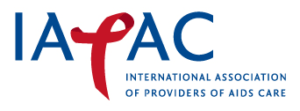
IAPAC Responds to President Trump’s Call to End the US HIV Epidemic by 2030
Statement by Dr. José M. Zuniga
President/Chief Executive Officer, IAPAC
February 5, 2019 – Washington, DC, USA
“The International Association of Providers of AIDS Care (IAPAC) supports President Trump’s commitment from his State of the Union address to end the HIV epidemic in the United States by 2030. The goal to end the US HIV epidemic is more than aspirational – it is achievable. We have the tools at our disposal to curb new HIV infections and end AIDS-related deaths. Among the barriers impeding our ability to leverage these tools are persistent HIV-related stigma and discrimination, the affordability of healthcare services, parallel mental health and substance use epidemics, and housing instability. Resolving these barriers requires the Trump Administration’s attention and the meaningful engagement of stakeholders, notably HIV-affected communities.
President Trump’s call to action can play a vital role in reaffirming the right of all Americans to be treated with dignity and respect regardless of their HIV status, and their right to benefit from evidence-based HIV prevention, treatment, and supportive services. We call on the Trump Administration to focus its efforts and resources in communities that are heavily affected by HIV and among key populations that face intersectional challenges to their whole health and quality of life. Such a focus is a critical component of any new federal strategy to end the HIV epidemic in the United States.
Diverse stakeholders from 21 municipalities* across the United States have already joined the Fast-Track Cities initiative with more than 250 cities around the world to accelerate their local AIDS responses and end AIDS as a public health threat by 2030. IAPAC will engage with affected communities, clinicians, and policymakers at the federal, state, county, and municipal levels to harmonize with and link our Fast-Track Cities work to renewed efforts by federal agencies to ensure that the US national HIV response leaves no American behind.”
###
With more than 30,000 members globally, IAPAC is the largest association of clinicians and allied health professionals working to end AIDS as a public health threat by 2030. Visit: www.iapac.org
*21 US cities, counties, and the District of Columbia are part of the Fast-Track Cities network, including Atlanta/Fulton County; Austin; Baltimore; Baton Rouge; Birmingham; Boston; Chicago; Metro Denver; Miami-Dade County; Minneapolis; New York; New Orleans; Oakland/Alameda County; Phoenix; Providence; San Antonio/Bexar County; and San Francisco. Columbia, SC, is slated to join the Fast-Track Cities network on February 7, 2019, as are several other priority U.S. cities later in the year. Visit www.iapac.org/fast-track-cities for more information.





